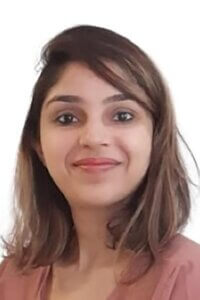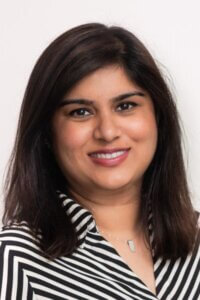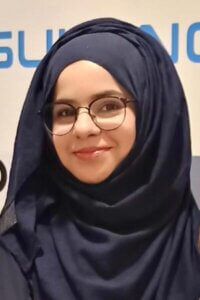Women in Actuarial Science in Pakistan: Part 2
A further look at the inspirational career journeys of Zahny Amlany, FSA, CERA; Raazia Haji, FSA, CERA, FCIA; and Manaam Shahid, ASA
December 2024Photo: Shutterstock/Atstock Productions
With an increasing number of young women considering actuarial science as a viable study and career path in Pakistan, The Actuary made an in-depth connection with three women making strides in the actuarial profession in Pakistan.
- Zahny Amlany, FSA, CERA
- Raazia Haji, FSA, CERA, FCIA
- Manaam Shahid, ASA
- Zahny Amlany, FSA, CERA, head of Actuarial Services at EFU Life Assurance: Utilizing her 15-plus years of experience in Pakistan’s insurance industry, Zahny has developed a deep understanding of the complex global financial services landscape. Driven by her commitment to reimagining financial security, she has been instrumental in developing business strategies that address the insurance industry’s evolving needs. Zahny is currently pursuing a global MBA from Bayes Business School (formerly Cass Business School) in the United Kingdom. She is based in Karachi, Pakistan.
- Raazia Haji, FSA, CERA, FCIA, head of Financial Reporting, Reinsurance, Budget, In Force Management and Analytics in the Actuarial and Strategic Planning department at EFU Life Assurance: Raazia is a University of Toronto graduate with more than 15 years of international experience in life insurance and actuarial consulting. She is currently based in Karachi.
- Manaam Shahid, ASA, actuarial manager at SHMA Consulting with nearly six years of experience in consultancy and insurance: She has a BSc in Actuarial Science from the London School of Economics and Political Science (LSE) and is an ASA “on the cusp of becoming an FSA.” Manaam’s expertise is in life and general pricing, risk analysis and financial modeling, with a focus on aligning actuarial insights with business objectives. She is based in Karachi.
Their stories offer a powerful source of motivation for individuals in Pakistan aspiring to enter this challenging yet rewarding profession. Here’s more of what they had to say about their career journeys.
Could you tell us about your job and its responsibilities? What do you like best about working as an actuary, and what are the most critical actuarial skill sets?
Zahny: As the head of Actuarial Services at EFU Life Assurance, Pakistan, my role is central in shaping and executing strategic initiatives that drive our organization’s success. I oversee product development, financial reporting, analytics and risk management, ensuring that our strategies align with the company’s vision and objectives.
Learn More
Read “Women in Actuarial Science in Pakistan: Part 1” with Zahny Amlany, Raazia Haji and Manaam Shahid.
For more information, access the SOA’s FAQs on Pakistan.
One of the most exciting aspects of my role is applying logic and problem-solving skills to tackle complex challenges. Analyzing business issues, developing strategies and implementing workable solutions for real-world applications is both incredibly rewarding and intellectually stimulating. Working with a team of talented and ambitious professionals in an organization with a bold vision allows me to continuously learn and find innovative ways to make an impact.
A significant part of my job involves empowering and developing my team. I take great pride in nurturing leadership potential within my team and supporting their growth. Seeing deserving and committed employees advance and contribute to our collective success is one of the greatest joys of my role.
The most critical actuarial skill sets essential to my work include:
- Understanding the big picture: Recognizing how individual tasks and projects contribute to broader organizational goals helps align efforts with strategic objectives.
- Critical thinking: Asking insightful questions to understand the underlying issues and objectives enables more effective problem-solving.
- Effective communication: The ability to compellingly present actuarial concepts and analyses helps ensure that stakeholders understand and support recommendations.
- Stakeholder engagement: Building and maintaining strong relationships with internal and external stakeholders, combined with effective collaboration, are key to advancing the company’s mission.
Raazia: I currently lead the Financial Reporting, Reinsurance, Budget, In force Management and Analytics teams at EFU, with 12 team members reporting to me. My team provides executives and the board with insights into the company’s performance and outlook. Pakistan is in the process of implementing a risk-based capital regime, so understanding and fulfilling the regulatory requirements and providing industry feedback falls under my Financial Reporting team. We are expanding the In force Management and Analytics area to utilize our data to provide insights and drive decision-making. Furthermore, we are enhancing our Budget area to help the board get more frequent reporting on actual vs. expected profitability and the sources of variance. We also support corporate planning by evaluating the financial impact of strategies. As a lead, I am also involved in recruitment, coaching, team development and oversight.
I enjoy collaborating with multiple teams, gaining an organizational view and developing a strong understanding of the life insurance business.
As actuaries, we have strong analytical skills. It is critical that actuaries also are able to communicate their analysis to both technical and nontechnical audiences. Further, it is extremely important that an actuary has a curious nature, a desire to understand and strong critical thinking skills.
Manaam: I am currently working as a manager at SHMA, a renowned actuarial consultancy. I oversee pricing, risk analysis and financial modeling of insurance products while ensuring regulatory compliance of the clients that I am responsible for. I also mentor junior actuaries and collaborate with cross-functional teams to align actuarial insights with business goals.
What I enjoy most about being an actuary is the blend of analytical problem-solving and strategic decision-making. It’s rewarding to see how our work directly impacts financial stability and client outcomes.
I feel the most critical actuarial skills include strong mathematical and statistical abilities, proficiency in data analysis tools and a deep understanding of financial theory. Equally important are soft skills like communication and project management to effectively balance multiple tasks and deadlines.
Can you share how you’ve navigated challenges to managing work-life balance as a Pakistani woman in the actuarial field?
Zahny: Balancing work and personal life remains a challenge for me, especially because I am deeply passionate about my work and often find it difficult to disconnect. Over time, I’ve developed habits to set boundaries. One of these is my morning fitness routine before diving into work, which provides a sense of calm and focus to start the day right.
I’m also becoming more aware that I cannot pour from an empty cup. Prioritizing self-care and finding moments to recharge have been crucial. While I’m still working on achieving a better balance, I’m learning that unplugging from work periodically is necessary for sustaining productivity, passion and overall well-being.
Raazia: I think work-life balance is something that is still new to Pakistan. As a society, we are very work-centric and don’t always value time and efficiency. Work is always expected to come first. The awareness that we need to focus on our health and families and that regular downtime is needed to be productive in the workplace is something we are just starting to talk about. Women tend to suffer more because of the traditional cultural expectation that women are homemakers and primary caregivers.
It is important that we, as women, don’t overextend ourselves in fulfilling the dual demands of work and home. We should be able to pursue our career aspirations and obtain financial security while maintaining our personal lives. For this, we need to secure the support of our employers and families.
As women speak up about the support they need to excel in both personal and professional spheres, they will find they are not alone and that there is strength in numbers. With the talent shortage, it is important that organizations tap into the female workforce, make themselves inclusive and offer work-life balance to both genders, so men can take on a greater role at home and we can increase the overall wellness and productivity of our workforce.
I am optimistic that with increased awareness of the importance of wellness and mental health, we will build a better work-life balance for both genders.
Manaam: Balancing work and personal life in the actuarial field can be challenging, especially with societal expectations in Pakistan. Managing long hours, rigorous exam preparation and family responsibilities required strong time management and clear boundaries.
At the start of my career, I was not fully aware of the severity of the demands that come with this career. There were numerous instances where I found myself physically and mentally exhausted due to the regulatory and project deadlines and client pressures. Through time, I have learned to navigate these challenges by prioritizing tasks, seeking support from family and colleagues and embracing flexible work arrangements where possible. Maintaining open communication with my employer about my needs has also been crucial. Additionally, I’ve learned to set realistic goals and make time for self-care to avoid burnout while advancing in my career.
What roles have mentorship, networking and critical societal support systems like family played in your career?
Zahny: I have been fortunate to have a strong support system throughout my career, which has been instrumental in my growth and success. While the presence of female role models in the actuarial profession locally is limited, I have had the privilege of working with many men who not only believed in my potential but actively encouraged me to pursue my ambitions.
The actuarial profession is unique in that it fosters a tight-knit community. This small, interconnected network has been incredibly helpful throughout my career. Whether locally or internationally, I have been able to reach out to fellow actuaries to discuss ideas, seek advice or gain insights on specific issues. This sense of community has provided a wealth of knowledge and support at various points in my journey.
Lastly, my family’s unwavering support and belief in my abilities have given me the assurance and motivation I need to persevere. Knowing that they believed in me without reservation allowed me to focus on my goals with determination and belief in myself.
Raazia: Attending local actuarial events hosted by the Society of Actuaries (SOA), Canadian Institute of Actuaries (CIA), Actuarial Students’ National Association (ASNA) and Pakistan Society of Actuaries (PSOA) has been a great way to meet fellow actuaries, learn about their roles, build long-term connections and stay updated on industry topics.
Joining and then later chairing the social committee at work was a fun way to build relationships across teams. Building these relationships in an informal setting always helps later when you work with the same people on cross-collaborative projects.
Growing up, I saw my mother working and pursuing her master’s, so the concept of a working woman was not new to my family. I’ve been blessed that my family has supported me throughout my career journey and has always been understanding, especially when I was writing exams or unavailable during reporting season. Their support has been invaluable to my success.
Manaam: My parents have been my greatest supporters, consistently prioritizing my education and personal growth above all else. Their unwavering belief in my potential gave me the confidence to push beyond societal expectations and pursue my career without feeling constrained by gender norms. They never allowed me to feel limited by the pressures or expectations from extended family. Instead, they encouraged me to challenge myself, embrace opportunities and aim higher, which has been crucial to my development. Their support has been instrumental in helping me grow both personally and professionally.
Statements of fact and opinions expressed herein are those of the individual authors and are not necessarily those of the Society of Actuaries or the respective authors’ employers.
Copyright © 2024 by the Society of Actuaries, Chicago, Illinois.




